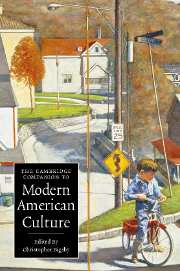Book contents
- Frontmatter
- 1 Introduction: What, then, is the American?
- 2 The American century
- 3 The regions and regionalism
- 4 Immigration to the United States in the twentieth century
- 5 Religion in the United States in the twentieth century: 1900-1960
- 6 Shifting boundaries: religion and the United States: 1960 to the present
- 7 The Hispanic background of the United States
- 8 African Americans since 1900
- 9 Asian Americans
- 10 Women in the twentieth century
- 11 Queer America
- 12 The United States, war, and the twentieth century
- 13 The culture of the Cold War
- 14 Secret America: the CIA and American culture
- 15 Vietnam and the 1960s
- 16 New York City and the struggle of the modern
- 17 Music: sound: technology
- 18 African American music of the twentieth century
- 19 Hollywood cinema
- 20 Popular culture
- 21 Theatre
- 22 Society and the novel in twentieth-century America
- 23 “Preferring the wrong way”: mapping the ethical diversity of US twentieth-century poetry
- Index
- Series List
23 - “Preferring the wrong way”: mapping the ethical diversity of US twentieth-century poetry
Published online by Cambridge University Press: 28 January 2007
- Frontmatter
- 1 Introduction: What, then, is the American?
- 2 The American century
- 3 The regions and regionalism
- 4 Immigration to the United States in the twentieth century
- 5 Religion in the United States in the twentieth century: 1900-1960
- 6 Shifting boundaries: religion and the United States: 1960 to the present
- 7 The Hispanic background of the United States
- 8 African Americans since 1900
- 9 Asian Americans
- 10 Women in the twentieth century
- 11 Queer America
- 12 The United States, war, and the twentieth century
- 13 The culture of the Cold War
- 14 Secret America: the CIA and American culture
- 15 Vietnam and the 1960s
- 16 New York City and the struggle of the modern
- 17 Music: sound: technology
- 18 African American music of the twentieth century
- 19 Hollywood cinema
- 20 Popular culture
- 21 Theatre
- 22 Society and the novel in twentieth-century America
- 23 “Preferring the wrong way”: mapping the ethical diversity of US twentieth-century poetry
- Index
- Series List
Summary
In the nineteenth century, poets like Whitman and Dickinson seemed to thrive on the impulse to push at boundaries and to seek out new idioms for an American vernacular poetics. In reaction to the weary genteel romanticism of much poetry at the turn of the nineteenth century, this transgressive impulse became more pronounced with the innovations generated by modernist poets such as William Carlos Williams, T. S. Eliot, and especially Ezra Pound, whose mantra “make it new” encapsulates this energetic thrust. While modern American poetry is indeed a broad, disparate field, embracing a range of practices and styles, nevertheless, no study of American poetry in the twentieth century can legitimately ignore the signal contributions of the modernists T. S. Eliot, Ezra Pound, William Carlos Williams, Robert Frost, and Wallace Stevens. Many of the driving formulations and elaborations of contemporary poetics owe themselves to Pound's intervention in what he saw as the dilapidated and dead-end poetics of late-nineteenth-century romanticism.
- Type
- Chapter
- Information
- The Cambridge Companion to Modern American Culture , pp. 450 - 468Publisher: Cambridge University PressPrint publication year: 2006
- 1
- Cited by



